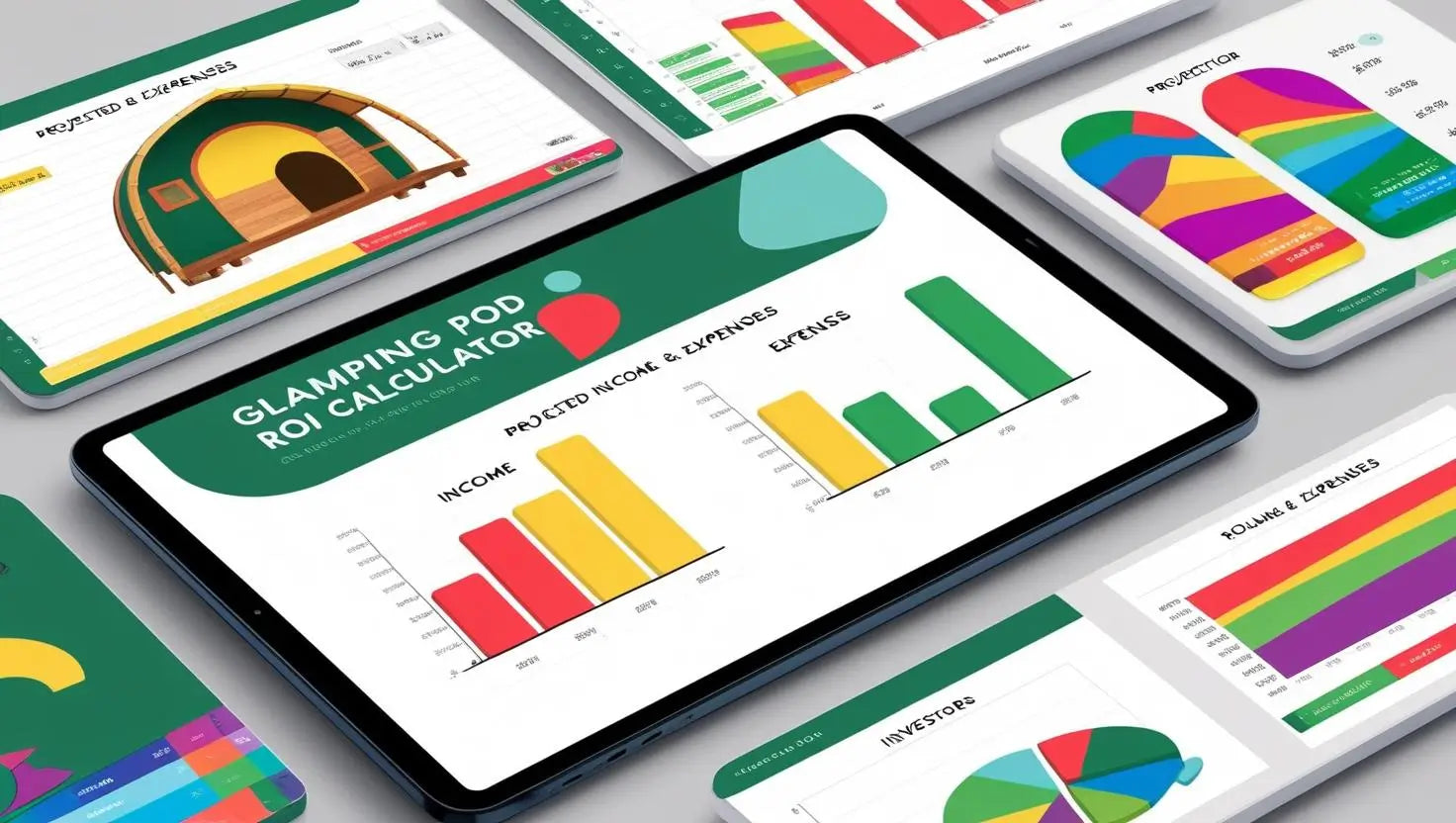Read Time: 10 mins
Ever wondered how some businesses manage to land contracts for community projects, like modular shelters, wellness pods, or temporary clinics? The answer usually lies in something called a procurement framework.
If your business wants to work with the public sector or support local community initiatives, understanding how these frameworks operate is essential. Whether you’re supplying glamping-style pods for wellbeing retreats, modular units for healthcare, or accommodation for homelessness projects, knowing how the system works gives you a real head start.
In this quick guide, we’ll break down what procurement frameworks are, why they matter, and how you can make them work for your business, plus how partnering with a specialist like GlampLaunch can make the process simpler and more rewarding.
What Is a Procurement Framework?
Put simply, a procurement framework is a pre-approved agreement that allows public sector organisations, such as central government departments, local councils, NHS trusts and housing associations, to buy goods and services from trusted suppliers.
Once a supplier is accepted onto a framework, that organisation can place orders (known as call-offs) without launching a brand-new tender process each time. This saves time, reduces paperwork and ensures public money is spent efficiently.
For businesses, being on the right framework means you’re visible and ready when opportunities arise. In the UK, frameworks can cover everything from construction and modular buildings to temporary accommodation, community pods, and even off-grid living structures. If your company supplies glamping pods, modular shelters or similar products, joining a relevant framework can be a powerful way to open doors to public-sector projects.

Why Frameworks Matter for Community & Public Sector Projects
Public procurement might sound bureaucratic, but it represents one of the biggest opportunities for UK businesses, especially those supplying innovative, community-focused products. Here’s why frameworks are worth paying attention to:
1. Big Budgets, Big Potential
Public sector spending in the UK is enormous. According to the House of Commons Library, gross public sector procurement spending reached £434 billion in 2024/25, a figure that highlights just how much opportunity exists for suppliers. (Research Briefings)
With the Procurement Act 2023 coming into force in February 2025, buying routes and frameworks are evolving to make procurement more transparent, competitive and accessible, particularly for SMEs and local suppliers.
2. Faster Routes to Contract
Once you’re on a framework, public sector buyers can place orders more quickly, avoiding the need to repeat lengthy tender processes each time. That’s a major advantage for community-driven projects such as temporary health clinics, homelessness shelters, or modular pod installations, where speed and flexibility are key.
3. A Focus on Community and Social Value
Public bodies are increasingly prioritising social value, the positive impact a project delivers for local communities, the environment and the economy. Frameworks often include these commitments as part of their criteria.
The National Procurement Policy Statement (NPPS), effective from February 2025, reinforces this focus. For suppliers like those offering glamping pods or modular shelters for community use, this is a golden opportunity to demonstrate how your products support local jobs, sustainability and community wellbeing.
How the Framework Process Works (Step by Step)
If you’re new to public procurement, the process might sound complex, but once you understand the stages, it’s quite straightforward. Here’s how a typical framework works from start to finish:
1. Framework Set-Up
A public body or joint purchasing organisation first establishes the framework. This includes defining:
The type of goods or services required (e.g. modular buildings, temporary accommodation pods, or community shelters)
• Supplier eligibility criteria
• Terms and pricing structure
• The overall duration of the framework
This initial stage sets the rules and ensures only qualified suppliers are considered.
2. Supplier Application
Next, suppliers can apply to join the framework when an opportunity is published. This usually involves submitting:
• Evidence of experience and capability
• Insurance and compliance documents
• Social value and sustainability credentials
• Pricing or cost models
Websites like Stotles often list open framework opportunities and provide guidance on how to apply.
3. Call-Offs and Mini-Competitions
Once the framework is live, public bodies can start buying from it. When an organisation, say, a local council, needs glamping pods for a community project, they can:
• Directly award a contract to a pre-approved supplier (call-off), or
• Run a mini-competition among suppliers on the framework to secure the best value.
This streamlined process saves time and ensures quick access to trusted suppliers.
4. Delivery and Contract Management
Once awarded, the supplier delivers the goods or services. For example, installing the pods ensures all commitments are met. This includes:
• Meeting social value and community benefit targets
• Maintaining quality standards
• Managing performance throughout the contract period
Good contract management helps build trust and increases the chance of future opportunities.

What This Means for Glamping and Community-Pod Suppliers
If your business supplies structures such as glamping pods, community units, temporary clinics, or shelters, there’s real potential to benefit from public-sector procurement. The key is positioning your offering effectively within the right frameworks. Here’s how:
1. Target the Right Frameworks
Start by identifying frameworks that align with what you provide. For example, modular building, temporary accommodation, or community wellness pod frameworks. These are often the most relevant routes for suppliers in the glamping and modular construction space.
2. Emphasise Your Unique Selling Point (USP)
Show buyers the flexibility of your products. For instance, your glamping pods might not only serve as holiday accommodation but can also be adapted for wellness retreats, recovery spaces, temporary clinics, or homeless shelters. This dual-purpose appeal makes your offering more valuable to public-sector buyers.
3. Highlight Social Value
Public sector organisations want to see genuine community benefits, from local job creation and skills training to sustainable materials and low-impact design. Make sure your social value story is front and centre in your proposals and marketing materials.
4. Get Your Documentation Ready
Framework applications typically require a strong evidence base. Have the essentials ready, such as:
• Insurance certificates
• Health & safety documentation
• Sustainability credentials
• Delivery and installation capabilities
• Maintenance and aftercare support
Being prepared not only speeds up applications but also gives buyers confidence in your professionalism.
5. Engage Early with Buyers
Don’t wait until a tender goes live. Reach out to local councils, NHS estates teams, and community development organisations to introduce your products. Being on a framework makes you easier to engage with, but being known and trusted helps you get noticed when opportunities arise.
Key Legal & Policy Updates to Watch
Public procurement in the UK is changing, with new laws and guidance shaping how public bodies buy goods and services. Here are the essentials suppliers should know:
1. The Procurement Act 2023: Effective from 24 February 2025, the Procurement Act 2023 modernises the UK’s buying rules, making them more transparent, flexible and SME-friendly. It replaces older EU-based regulations and puts stronger emphasis on value for money, public benefit, and integrity in procurement. (GOV.UK)
2. The National Procurement Policy Statement: The NPPS outlines what public bodies must prioritise when awarding contracts, including sustainability, social value, and community benefit. For pod and modular suppliers, this means showing how your products create a positive local impact. (NPPS)
3. Frameworks Still Lead the Way: Framework agreements remain one of the most effective ways to work with public-sector buyers. Market insights from Tussell suggest suppliers should identify which frameworks and Dynamic Purchasing Systems (DPSs) cover their niche, from modular buildings to temporary accommodation. (Tussell)
Tips for Suppliers Working on Community-Focused Procurement
If you’re aiming to supply pods or modular structures for projects such as homeless shelters, temporary clinics, or community wellness spaces, success often comes down to how well you understand public-sector priorities. Here are some key tips to help you stand out:
1. Understand the Brief: Every community project has clear objectives, from accessibility and sustainability to durability and ease of use. Make sure your product meets (and ideally exceeds) those requirements, demonstrating that it’s designed with long-term community benefit in mind.
2. Offer Flexibility: Public-sector buyers value suppliers who can adapt. If your glamping pods can also function as temporary clinics, recovery spaces, or community hubs, make that flexibility clear. It widens your appeal and shows that your solution offers lasting value.
3. Emphasise Local Delivery and Support: Highlight how you deliver, install and maintain within the local area. Councils and community organisations like to see investment flowing back into the region, whether that’s through local jobs, partnerships or ongoing maintenance contracts.
4. Demonstrate Sustainability: Sustainability is now a core consideration in all public-sector buying. Use materials responsibly, show low energy consumption, and emphasise modularity and minimal ground impact. The greener your solution, the more attractive it becomes.
5. Showcase Social Value: Public buyers want measurable community benefit. Prepare case studies or impact summaries showing how your projects support local employment, apprenticeships, or skills development, for example:
“Ten pods supplied, local installer engaged, training for two apprentices.”
6. Get on the Right Frameworks Early: Being approved on relevant frameworks is often half the battle. It makes your business visible to decision-makers and means you’ll be considered when new opportunities arise, without the need to start from scratch.

Product Spotlight: Pods Built for Community & Public-Sector Projects
At GlampLaunch, our pod designs are created to deliver long-term value across education, wellbeing, and community use, all while meeting public-sector standards for sustainability and accessibility.
• Library Pod: A calm, self-contained reading or study space ideal for schools, community centres, or public libraries. Its insulated structure, natural lighting and modular design make it perfect for learning and wellbeing projects.
• Office Pod: A versatile workspace that can serve as a community hub, remote office, or consultation space for local initiatives. Quick to install and energy-efficient, it offers flexibility for councils, charities, and small organisations alike.
Talk to GlampLaunch about how our pods can support your next community or public-sector project, from design to installation and beyond.
Conclusion
Public procurement might seem complex, but once you understand how frameworks work, and how to align with priorities like social value, sustainability, and community impact, it becomes a powerful route to opportunity.
With over £434 billion spent across UK public procurement in 2024/25, and new reforms under the Procurement Act 2023 and NPPS, now is the perfect time to get involved.
At GlampLaunch, we make that process simple. We manage everything from design and planning to installation, with a clear understanding of what public buyers need. Our pods are versatile, ideal for glamping, community, library or office use, and every project supports British manufacturing, local installers and real community benefit.
If you’re exploring pod-based solutions for your next public-sector or community project, talk to GlampLaunch. We’ll help you turn opportunity into impact.
👉 Book a free Pod Vision Consultation to discuss your project and see how our pods can meet your public-sector needs.
Summary
• The UK public sector spends over £434 billion annually on procurement, a huge opportunity for suppliers offering community-focused or modular solutions.
• A procurement framework is a pre-approved list of suppliers that allows public bodies to buy goods and services efficiently without repeating tender processes.
• Frameworks matter because they offer faster routes to contract, consistent demand, and increasing focus on social value and sustainability.
• The Procurement Act 2023 and National Procurement Policy Statement (NPPS) are reshaping how organisations buy, making processes more transparent and SME-friendly.
• Suppliers can benefit by targeting the right frameworks, showcasing their flexibility, and demonstrating community impact and environmental responsibility.
• GlampLaunch pods, including the Library Pod and Office Pod, are designed for public and community projects, offering versatility, sustainability, and British-built quality.
• Working with GlampLaunch means end-to-end delivery, procurement-ready expertise, and solutions that support local jobs and social value.
• Businesses ready to engage in public procurement can gain a competitive edge by understanding frameworks and partnering with experts like GlampLaunch.
FAQs
1. What is a public procurement framework in the UK?
A public procurement framework is a pre-approved agreement that allows government bodies, councils, NHS trusts and housing associations to buy goods and services from trusted suppliers.
Once a company joins a framework, buyers can place orders, known as call-offs, without restarting a full tender process. This makes procurement faster, fairer and more efficient for both public buyers and suppliers.
2. How can my business get on a public procurement framework?
To join a framework, you’ll need to apply when an opportunity is advertised, usually through platforms like Contracts Finder, Find a Tender, or Stotles.
Applications typically require proof of capability, insurance, health and safety policies, sustainability credentials, and social value commitments. Once approved, your business becomes visible to public-sector buyers looking for suppliers in your category.
3. Why are procurement frameworks important for glamping and modular-pod suppliers?
Procurement frameworks open up access to large-scale public and community projects, from temporary clinics and wellness hubs to educational or housing schemes. For glamping and modular-pod suppliers, being on a framework means you can offer flexible, sustainable solutions that align with public-sector goals like community benefit, local job creation and environmental responsibility.
4. What is the Procurement Act 2023, and how does it affect suppliers?
The Procurement Act 2023, which came into effect in February 2025, modernises how the UK public sector buys goods and services. It simplifies the process, increases transparency, and makes it easier for small and medium-sized businesses (SMEs) to compete for public contracts.
For suppliers, it’s a positive change that rewards quality, value for money, and social impact.
5. How can GlampLaunch support public-sector and community projects?
GlampLaunch specialises in designing, manufacturing and installing high-quality modular pods tailored to community and public-sector use. From library pods and office pods to wellness and accommodation spaces, each build supports sustainability, accessibility, and local economic growth.
Our end-to-end service, from design to delivery, ensures every project aligns with procurement requirements and delivers real community value.





